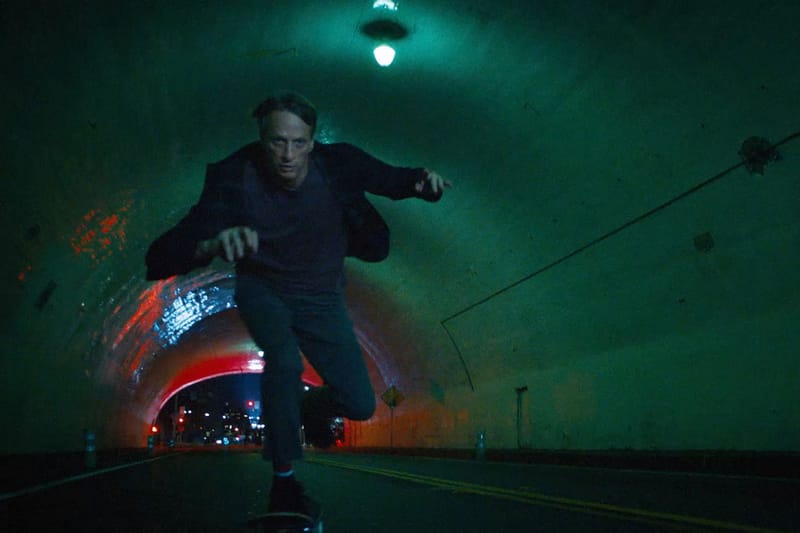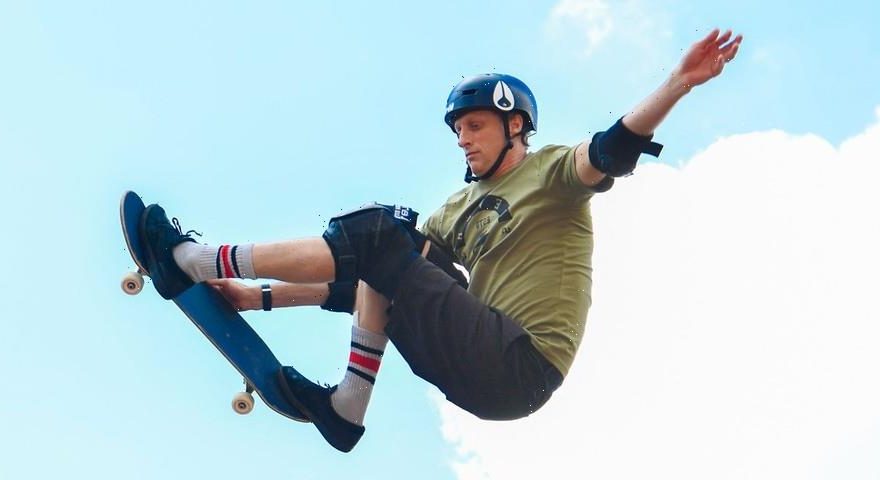For the first time ever, skateboarding will be included as an Olympic sport at the 2021 Tokyo Games. In honor of the sport’s international distinction, the Olympics committee has unveiled its latest “Stronger Together” campaign video, delving into Tony Hawk‘s trailblazing journey in the skate park.
“There’s no one better to represent the arc of the sport of skate boarding than Tony Hawk,” the International Olympic Committee’s director of digital engagement, Chris Carroll, told HYPEBEAST. “He’s a global ambassador for the development of the sport and the sports evolution. We feel very privileged that, he’s partnering with us to tell his story.”
Between the highs, the lows and the cracked pavement that Hawk has called his stage for almost 40 years, the Olympics latest campaign visual showcases how the Games’ skateboarding recognition will skyrocket the sport’s main players to an international level of notoriety.
“That’s actually the genesis of what our content approach is, which is called athletes voice, which is all about telling stories from the athlete’s point of view. And in this case, Tony’s representing the whole skateboard community — their inspiration, their struggle and their resilience in being athletes,” Carroll added.
At the Games, skateboarding will be divided into two categories: park and street. Street skating will involve rails and stairs mimicking those of an urban cityscape, while park will feature ramps and pipes similar to that of a traditional skatepark.
“We want to take sport to youth, and with so many choices that youth have today, you can’t wait for youth to come to you, so we have to go to them,” Carroll said. “I think skateboarding’s inclusion in the Olympic game program represents our ongoing urban movement within the Olympics.”
Ahead of the the Games’ commencement on July 23, HYPEBEAST spoke with Tony Hawk about his first steps into the skatepark, his take on the Olympics’s skateboarding distinction and how he plans to utilize his influence to inspire the next generation of skaters. Read what Hawk had to share below, and revel in the Olympics’ “It All Starts With A Push” video above.
HYPEBEAST: How did you initially enter the skating world?
Tony Hawk: I started in the late seventies when it was a bit of a fad and my older brother was skating because he was a surfer, and that was a direct extension of surfing at the time. I mostly kicked up for transportation in those days. A couple of my friends were also skating, just as a hobby. And then eventually, I got to visit a skate park in San Diego. I think that’s when I knew I wanted to stick with it because I saw things there that were fascinating to me and things that I wanted to emulate. I literally saw people flying and I thought I want to do that. I want to fly.
How did you learn to navigate that world, without social media and all of the digital tools that exist today, and turn that passion into a career?
Through competition. That was the only way to be measured on your abilities back then, because there was obviously no social media. There was no way to compare skaters to each other besides actually getting into a competition. The competitions were the big gathering. I got better as I continued, and it was much more challenging and it forced me to start learning techniques outside of my comfort zone. Eventually, I rose up the ranks and that’s how I got my first endorsements and sponsorships. I was really young though, so it wasn’t like I thought I was choosing a career. I was excited that I was recognized for my talent and that I was making a little bit of money. It wasn’t until I got out of high school that I realized that a career had fallen in my lap.
Blazing the trail for future skaters to follow, what have you learned along your journey to where you are now?
Well, what I’ve learned is that we celebrate individuality and creativity more than anything, sometimes even more than competition standings. It is possible to make a living and have skating be a legitimate career and to always be challenging yourself. I think that’s what I’ve learned the most is that no matter how far you get with this, you’ve got to continue to pose new challenges for yourself because people will forget you if you’re not one-upping your last success.

You’ve coined a signature skating style that has allowed you to transcend above the sport’s growing competition. How did you go about embracing your original tricks and captivating that attention in skate parks?
It wasn’t something that I was trying to do actively, it was just more that I got recognized for being innovative with tricks. When I was younger and doing these tricks, the older skaters and some of my peers just thought it was robotic and they weren’t giving me any credit for it. They just thought I was more like a circus freak doing these baton twirls. And I think it wasn’t until later that I started to embrace the tricks in my style.
How do you hope to use your influence to inspire the next generation of skaters and communities at large?
I hope to create awareness for skating where maybe it didn’t exist or maybe that it wasn’t embraced. That’s really the larger picture of what I try to do is to show how much positive impact skating can have on kids. And a lot of times, communities, countries even, won’t accept skating as being legitimate or believe that it’s somehow got some negative connotations, and they discourage it altogether. And I think that, especially now with the coming of the Olympics, they’re going to see that it is validated, it is positive, it is healthy, it takes discipline and it takes perseverance.
How do you feel about the Olympics’ inclusion of skateboarding as an official sport?
I think it’s long overdue, but I think it’s going to be really great for skating on a more global scale. I’m excited for the home audience to truly understand what it takes to be a professional skateboarder because I think that there’s a lot of misconceptions about skating, that it’s for slackers or that they see people at skate parks and they’re trying and failing endlessly. And when you see what the fruit of that labor really is, and when you see it highlighted in a venue with that reach, I think that’s going to change a lot of perception.

How do you think the Olympics’ distinction might change the sport?
For one, it’s going to open up new opportunities, especially internationally, for facilities. And I think that is probably one of the best outcomes of all this. But I also think that it will at least help maybe the more judgmental members of society understand that skating can be a wholly positive influence on someone’s life. And I think that it’s going to attract people that maybe think that that’s their key to fame and fortune, which isn’t necessarily a great thing, but at the same time just gives us more participants.
What advice do you have for someone hoping to enter into a professional skateboarding career?
I would say embrace your individuality because you don’t want to just fall in line with whatever the cool tricks are. Skateboarding celebrates individuality and diversity, I think more than almost any other sport. And so the more that you stand out as unique, the more chance you have at being successful, if that’s what you’re choosing for a career.
Looking back at everything you’ve accomplished thus far and ahead at what’s to come, what do you ultimately want to be remembered for?
I hope to be someone who helped to raise the profile of skating in a positive way and someone who helped to provide facilities through our foundation The Skatepark Project. We’ve helped to fund over 1,000 skate parks to date, and half of those are already built and open.
Elsewhere, Liverpool-born skater Geoff Rowley reflects on skating’s increasing popularity ahead of the 2021 Tokyo Olympic Games.
Source: Read Full Article
